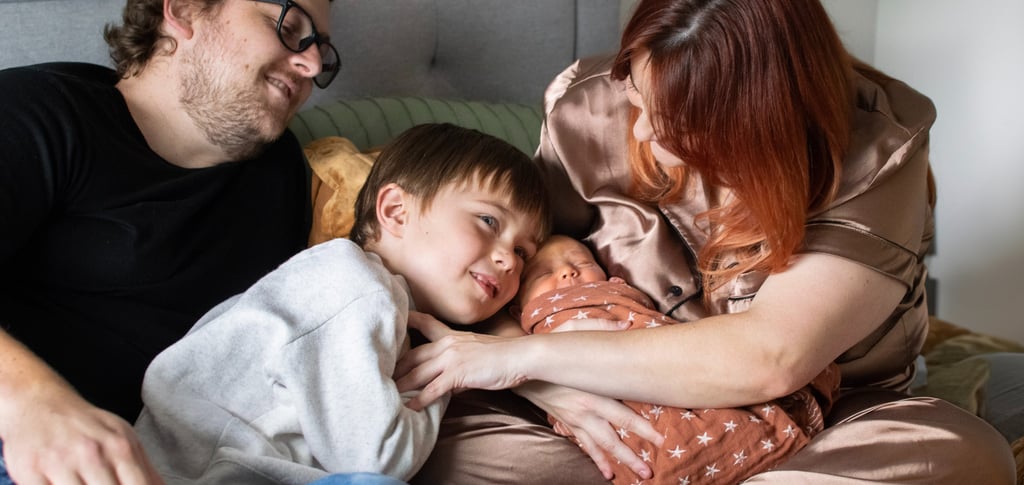What Doulas Do: Support for Every Stage of Life
Doulas do far more than hold hands during birth. From puberty to postpartum, fertility to loss, and everything in between, we offer education, advocacy, and compassionate care for every step of the reproductive journey.
COMMUNITY AWARENESS FOR DOULAS
Maeve Ebright
9/30/20253 min read


Doulas Are More Than Birth Partners
When most people hear the word “doula,” they picture someone coaching breathing techniques in a delivery room. And while birth support is a core part of what we do, it’s far from the whole story.
A doula’s role is to offer education, advocacy, emotional support, and practical guidance during some of the most transformative, and often vulnerable, moments in life. We’re companions, educators, and advocates rolled into one. Our goal is to make sure you feel informed, respected, and empowered in every decision you make about your body, your family, and your future.
At its heart, doula work is about meeting people where they are, whether that’s preparing for their first period, navigating fertility challenges, welcoming a baby, healing from loss, or supporting their reproductive health later in life.
Full-Spectrum Care: What That Means
"Full-spectrum doula" simply means we support people across the entire reproductive continuum, not just birth. Every person’s path is different, and we believe support shouldn’t end at any single milestone. Here’s what that can look like:
Fertility and Menstrual Health Support
The reproductive journey begins long before conception. Fertility and menstrual health doulas focus on education and empowerment during the earliest stages of reproductive life.
We help clients:
Understand their cycles and hormonal patterns
Learn fertility awareness methods (for conception and pregnancy prevention)
Navigate menstrual challenges or irregularities
Prepare emotionally and physically for trying to conceive
This kind of support can be life-changing, especially for those who never received comprehensive sexual or reproductive education in school.
Pregnancy and Birth Support
This is what most people think of when they hear “doula”, and with good reason. Pregnancy and birth doulas provide continuous, non-clinical support throughout pregnancy, labor, and delivery.
Our work includes:
Prenatal education and birth planning
Emotional and physical support during labor
Comfort techniques and coping strategies
Advocacy support to help clients understand their rights and options
Assistance navigating medical systems and interventions
Unlike medical professionals, doulas don’t perform exams or deliver babies. Instead, we focus on you, your experience, your preferences, and your sense of control in the process.
Postpartum and Newborn Support
The birth of a baby is just the beginning of a whole new chapter. Postpartum doulas support families as they recover, adjust, and grow into their new roles.
This support might include:
Postpartum recovery guidance
Lactation and feeding support
Newborn care education
Sleep, healing, and mental health resources
Household or sibling support in the early weeks
Having a doula in the postpartum period can reduce stress, improve parental confidence, and even lower the risk of postpartum depression.
Loss, Abortion, and Bereavement Support
Reproductive journeys don’t always follow the path we hope for. Full-spectrum doulas also provide compassionate, non-judgmental support through miscarriage, stillbirth, abortion, and other forms of loss.
We offer:
Emotional support and grief resources
Practical help with physical recovery
Rituals, memorial planning, and healing tools
Advocacy and companionship during procedures
Space to process, honor, and heal at your own pace
No one should have to walk through loss alone. Our role is to stand beside you, without judgment, without pressure, and without shame.
Specialized Care and Advocacy
Many doulas, including members of our collective, bring additional training and lived experience that allow us to support specific communities more deeply. Specialty services may include:
Neurodivergent and disability-informed care
Trauma-informed reproductive support
LGBTQIA+ family planning and transition-related care
Cultural and ancestral birth practices
Reproductive justice education and advocacy
These specialties help fill critical gaps in care, especially in underserved or rural communities where inclusive, affirming support can be hard to find.
Why Doula Support Matters
Research consistently shows that having a doula can lead to:
Shorter labor and lower rates of medical interventions
Higher satisfaction with the birth experience
Increased breastfeeding success
Better mental health outcomes postpartum
Improved communication between families and healthcare providers
But beyond the statistics, the heart of doula work is this: you deserve to feel supported, informed, and respected. No one should have to navigate the most intimate parts of their reproductive life alone.
How to Work With a Doula
Whether you’re planning a pregnancy, preparing for labor, healing from loss, or exploring your fertility options, a doula can be part of your care team. Here’s how to start:
Explore the types of support available, and find what feels right for you.
Schedule a consultation to discuss your goals, values, and preferences.
Build a support plan tailored to your needs.
Stay connected, your doula’s role can evolve with you over time.
Trusted Resources
DONA International – Global doula certification and education organization
Evidence Based Birth – Research and information about birth support
Postpartum Support International – Postpartum mental health resources
National Black Doulas Association – Directory and support for Black birthworkers
Birth Monopoly – Advocacy and patient rights resources
Take the Next Step
Learn more about our services – Explore how our collective can support you.
Join our collective – Interested in becoming a doula or advocate?
Request a consultation – Get personalized support tailored to your journey.
